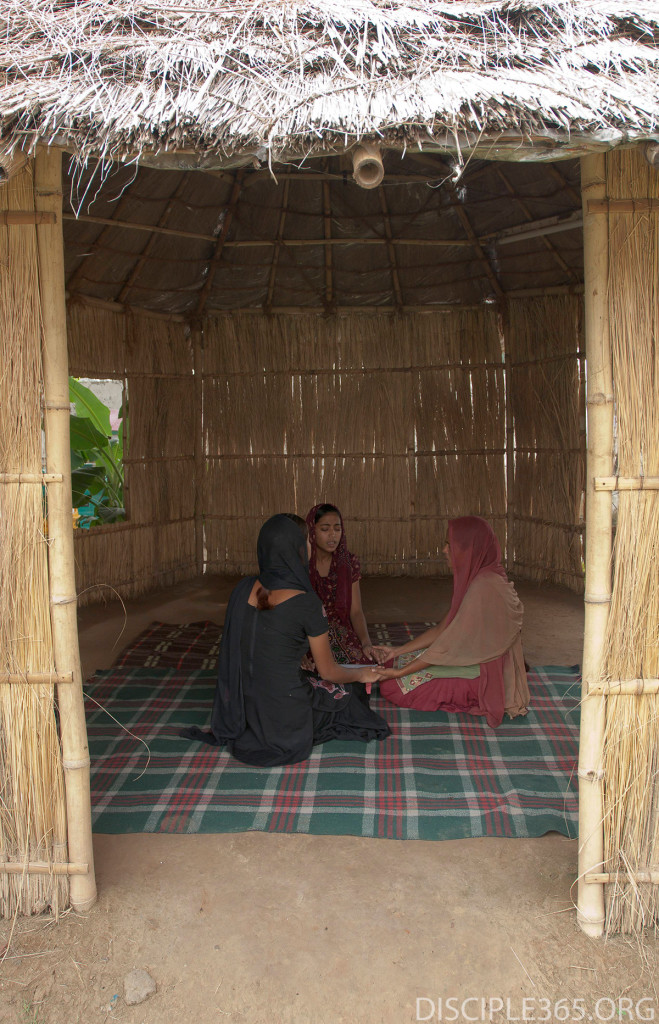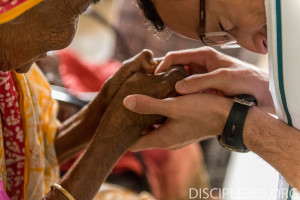Apr 17, 2016
 I was recently reading the book of Ruth. I found this story very interesting especially since the backdrop it is given is the book of Judges. The final verse in the book of Judges states, “In those days there was no king in Israel; everyone did what was right in his own eyes.” This phrase no king in Israel was sticking in my mind as I noticed that the first character in Ruth was Elimelech. I have had very basic instruction in Hebrew enough to know that “El” means God and “melech” means king. This piqued my interest God and king. I looked it up and His name means God is king. In Judges we see the natural appearance that there is no king and in Ruth we see the true reality that God is king.
I was recently reading the book of Ruth. I found this story very interesting especially since the backdrop it is given is the book of Judges. The final verse in the book of Judges states, “In those days there was no king in Israel; everyone did what was right in his own eyes.” This phrase no king in Israel was sticking in my mind as I noticed that the first character in Ruth was Elimelech. I have had very basic instruction in Hebrew enough to know that “El” means God and “melech” means king. This piqued my interest God and king. I looked it up and His name means God is king. In Judges we see the natural appearance that there is no king and in Ruth we see the true reality that God is king.
As we continue on in the book of Ruth we see that despite his name Elimelech had no confidence that God was his king. When things got tough he didn’t put his trust in God, but rather sought a solution in a nation that did not know God with disastrous results. I am sure we all know what happened.
However the story does not end there. We are introduced to Ruth, his daughter-in-law. This is where it gets exciting. She was not raised with the God Israel, but she possessed such a great faith in Him. She takes God as her God and will not leave Naomi. As a foreigner in Israel especially as a Moabitess she would be subject to the hatred of the people, but she had the confidence that God would care for them. This attitude of Ruth is what God had intended for His people that they recognise and trust Him as king.
For you and I, what can we glean from this? With the establishment of the Kingdom of Heaven and the New Covenant, God is our king . Do I live in the reality that He is king and will care and provide for me, or do I attempt to look for my provision and protection from myself? I have the testimony of Ruth and others throughout Scripture of what God will do if I trust Him and I am without excuse not to.
—School of Discipleship student
Please like and share this post:
Apr 5, 2016
 Forgiveness is something, I am finding, that has to be done daily. A person in my life who has a certain role in ministry has several times betrayed my trust. In consequence, though it should not be, I have trouble trusting anyone else who also serves in a similar role.
Forgiveness is something, I am finding, that has to be done daily. A person in my life who has a certain role in ministry has several times betrayed my trust. In consequence, though it should not be, I have trouble trusting anyone else who also serves in a similar role.
Christ has granted to me everything that pertains to life and godliness, why do I not have love for that person. I had not realised how much this person was affecting me until about a week ago and then it hit me twice in the same week that I was transferring the resentment I had for that person to others.
The reason that it is so difficult may be I am trying to forgive in my own strength. I am looking at what they have done rather than what Christ has done for me. To truly forgive I must allow the resurrected Christ to live through me and in such a way that His kingdom comes to earth. Forgiveness and everything else that is Godly comes only when we allow the Spirit of God to live our lives.
—School of Discipleship student
Please like and share this post:
Apr 1, 2016
 In the last two weeks, I have learned of the deaths of five different people. Four of them I didn’t know personally. They were friends or relatives of friends, however it does still affect you. Today I was able to take some time to grieve for these people. It was probably not the best to put it off so long, but sometimes it seems easier to ignore the pain in our lives not realising how it is impacting us.
In the last two weeks, I have learned of the deaths of five different people. Four of them I didn’t know personally. They were friends or relatives of friends, however it does still affect you. Today I was able to take some time to grieve for these people. It was probably not the best to put it off so long, but sometimes it seems easier to ignore the pain in our lives not realising how it is impacting us.
The one I knew personally was kind of the Grampa of the Church that I attended. A few years ago, I had helped him move to the place he was living at. We had precious times with the rest of the Church during Good Friday foot washing services. This is another topic, but it always seemed to connect the younger saints with the older ones. This and other activities with him made him dear to me although I never knew him well.
As I was thinking about their deaths and their lives, I was reminded of a statement about death by a 19th century author, “How strange this fear of death is! We are never frightened at a sunset.” Without our God and Saviour, death is a very fearful thing, however, He has passed through death and given us the hope of the resurrection. A sunset on the one hand is the end of a day, but it is also the promise of new day coming. The sun will return and everything will be bright again. This is also our hope for death for those of us in Christ. He will transport us into the new day of His kingdom where we’ll meet those who have passed through the sunset before us.
—School of Discipleship student
Please like and share this post:
Mar 26, 2016

Today, as I was praying, God reminded me of a phrase that was once quite special to me. The phrase is “a man after God’s own heart.” In my early teens, I spent a lot of time reading the books of Samuel and Kings. At the time I was looking for insights about faith and how people were demonstrating faith. I didn’t really understand faith so I ended up reading these books over and over and I became very familiar with the stories. It was at this time that this phrase began meaning a lot to me.
In my early twenties God brought me to a place where I spent a lot of time in the gospels and the teachings of Jesus. This concept of being a man after God’s own heart was kind of placed on the back burner for a time. Now God is bringing the two concepts together for me.
In class we have been learning about having a radical Christian lifestyle. A lifestyle in which we renounce and hate everything, that would keep us from pursuing our Father with all our heart, soul, mind, and strength. It is a lifestyle where we renounce everything as we pursue Christ.
What is it that enables us to do these things? How do we get from knowing that these are the right things to do to the place where we are able to do it? This is where I see being a man after God’s own heart fitting in. It is when we have that heart that we are able to pursue Christ radically without worrying about what others will think.
What does it mean to have a heart after God? I believe it means to be absolutely controlled by the Spirit of God. When we are totally yielded to His Spirit, we can live the radical life. The life and love of God will flow out of us. It will no longer be a standard that we are attempting to attain to but it will be a lifestyle that naturally flows out from the Spirit within us. This is having a heart after God. This is being a radical disciple. The life controlled by the Spirit is the life of True Discipleship.
—School of Discipleship student
Please like and share this post:
Aug 26, 2015
A couple of weeks ago, we had a time of solitude. During that time, God directed my attention to the second epistle of John. In this epistle, John reminds us that it is not a new commandment, to love one another but the original that was from the beginning. He immediately brings up that this is in opposition to the deceivers who teach that Jesus did not come in the flesh. What correlation do these two teachings have? It deserves a closer look.
Let us gather the context first. In the first part of the book John’s excitement for the truth is almost overwhelming. He uses the word five times in the first four verses. This culminates in his statement of joy that some of the children of the elect lady were walking in truth.
With this premise of excitement about truth, He naturally flows into the commandment to love one another. Defining love as walking according to the Father’s commandments, he states that loving one another has always been the commandment even from the beginning.
It came to mind that if this truly is the case I should be able to find it in the books of Moses. Looking at Genesis we learn that in the beginning God created the earth as a place to put man to dwell in unity with one another. A place where they could love one another, within the protection of God’s garden. However, man refused to live in love.
Having rejected the ideal place that had been provided for them, they were without hope. God, however, in the book of Exodus through His servant Moses, demonstrated that would not give up on them. He, in His mercy, gave them a law to show to everyone what love looks like in daily life. As I was reading Exodus recently, I noticed everything that is in the law is about either loving God or loving others and what this looks like in practical terms. Man, sadly, did not have the ability to live in this way of love.
God therefore had to become flesh and demonstrate that the life of love can only be lived by the power of the Holy Spirit. Now because He rose again, Jesus imparts the Holy Spirit to all who believe on Him. If He did not come in the flesh and be tempted in every way as we are, He could not give us the power of the Holy Spirit to live this way. Denying Jesus’ deity, therefore, is not just some random theological point. It is rejecting the means God has given us to live the way we are commanded i.e. through Christ and is thus intrinsically connected to loving one another.
Please like and share this post:
 I was recently reading the book of Ruth. I found this story very interesting especially since the backdrop it is given is the book of Judges. The final verse in the book of Judges states, “In those days there was no king in Israel; everyone did what was right in his own eyes.” This phrase no king in Israel was sticking in my mind as I noticed that the first character in Ruth was Elimelech. I have had very basic instruction in Hebrew enough to know that “El” means God and “melech” means king. This piqued my interest God and king. I looked it up and His name means God is king. In Judges we see the natural appearance that there is no king and in Ruth we see the true reality that God is king.
I was recently reading the book of Ruth. I found this story very interesting especially since the backdrop it is given is the book of Judges. The final verse in the book of Judges states, “In those days there was no king in Israel; everyone did what was right in his own eyes.” This phrase no king in Israel was sticking in my mind as I noticed that the first character in Ruth was Elimelech. I have had very basic instruction in Hebrew enough to know that “El” means God and “melech” means king. This piqued my interest God and king. I looked it up and His name means God is king. In Judges we see the natural appearance that there is no king and in Ruth we see the true reality that God is king.



Recent Comments